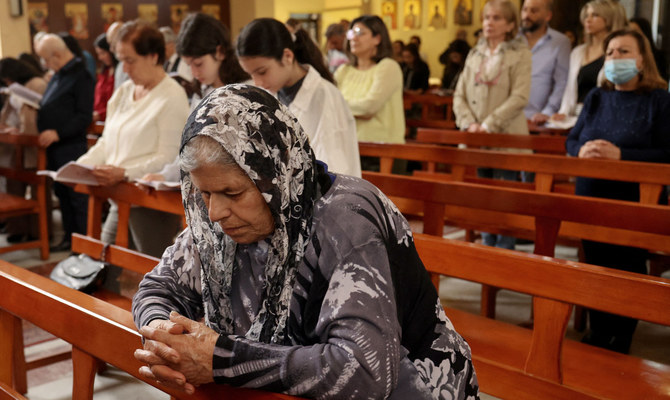BEIRUT: Maronite Patriarch Bechara Al-Rahi said Lebanon needs “a trustworthy leader” during Mass on Easter Sunday.
Al-Rahi added that “a leader that is not trusted cannot remain in power,” and said that the government could not allow the country to be used by “those disturbing its security and sovereignty.”
His appeal came as Western Christian communities celebrated Easter Sunday, the holiest day in its calendar, while Eastern Orthodox Christian communities celebrated Palm Sunday in Lebanon.
Sunday sermons addressed issues affecting Lebanon, including electing a president, regaining sovereignty and tackling poverty and hunger in the financially stricken country.
Al-Rahi asked during his sermon: “Until when will the Lebanese territory be open for every weapon holder? Until when will Lebanon and its people bear the repercussions of the external policies suffocating the country day by day?”
The sermons and references to sovereignty also came alongside friction with Israel following cross-border fire between militants in Lebanon and the Israel Defense Forces on Friday.
Among other skirmishes, a barrage of rockets was fired from the vicinity of Al-Rashidieh Palestinian camp in southern Lebanon toward the Upper Galilee, which was followed by retaliation by the IDF.
The government has faced criticism for its stance over the escalation in violence along Lebanon’s border with Israel.
Caretaker Prime Minister Najib Mikati reiterated that Lebanon “absolutely rejects any military escalation from its land and the use of its territory to carry out any operations that would destabilize the situation.”
Mikati said: “What is being said about the impotence and absence of the government in this regard is part of media campaigns targeting the government.”
He added: “From the outset of the events in the south, we made the necessary calls with all the concerned parties, as well as with international actors away from the spotlight, as these matters cannot be handled by creating media buzz and delivering statements.
“I also instructed the Ministry of Foreign Affairs to act in parallel and make the appropriate calls. During the crisis, I was holding a meeting with Italian Defense Minister Guido Crosetto and we asked him to pressure Israel to stop any operations leading to further tensions in the south.”
Mikati clarified that the initial investigations conducted by the Lebanese Armed Forces found that those who fired the rockets were not organized parties, but rather non-Lebanese elements.
“What happened was a reaction to the Israeli aggression on the Palestinian territories and the Gaza Strip,” he added.
Lebanon lodged a complaint with the UN Security Council and UN secretary-general against Israel.
In its complaint, Lebanon warned against “the seriousness of the recent developments in the region, especially the villages in southern Lebanon.”
It affirmed its “keenness on working to defuse the elements of strife and call for restraint and calm,” while holding Israel “responsible for the repercussions of any escalation that would blow up the situation on the southern Lebanese border.”
Lebanon also renewed its refusal to “use its territory as a platform to destabilize the existing tranquility while preserving its legitimate right to self-defense.”
Beirut reaffirmed that “keeping the lines of communication open with the UN and UNIFIL is the best way to solve problems and maintain calm and stability.”
In the complaint letter, the government reiterated its “adherence to the policy of restraint based on its awareness of the importance of stability and calm and its unwavering keenness to fulfil its international obligations.”
Lebanon also said the attacks carried out by Israel on Friday on areas in southern Lebanon “have endangered the lives of civilians and the safety of Lebanese territories,” deeming the incident “an act of aggression, a flagrant violation of Lebanon’s sovereignty, a threat to the stability that southern Lebanon enjoyed, a blatant violation of UN Security Council Resolution 1701, and a threat to international peace and security.”
It cautioned against “the critical repercussions of provocative Israeli practices in Jerusalem, and the breach of the sanctity of the holy places, in addition to the unjustified use of excessive force in places of worship against worshipers.”
It also denounced Israel’s refusal to “comply with the calls of the Security Council and the international community to refrain from taking escalatory steps during the holiday season.”



























